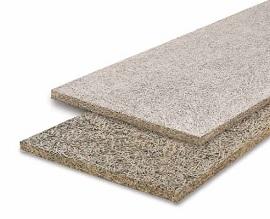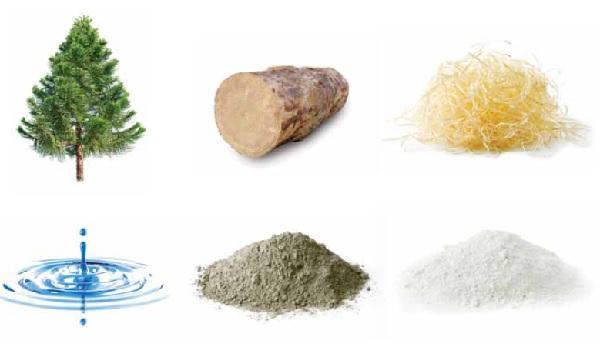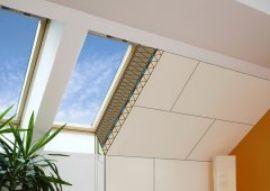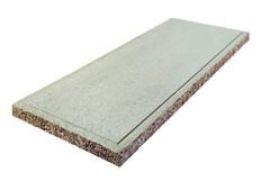Wood wool in building
Post from EditorialsThe mineralized wood-wool is a material which, for its excellent insulating properties and for its being green, is used much today in construction.
Insulate with wood wool
The prefabricated houses, being lightweight structures have problems in terms of summer thermal insulation, acoustic insulation, fire and humidity protection.
These issues need to be carefully taken into account at the design stage and treated appropriately.
One of the most used materials for the insulation in such cases is the wood wool, which is available commercially in the form of panels. In structures framed in wood or in metal the supporting structure, realized with uprights and beams, is spaced out by fibrous insulating material: wood wool.
In structures framed in wood or in metal the supporting structure, realized with uprights and beams, is spaced out by fibrous insulating material: wood wool.
The panels, available in different sizes, are suitable for the insulation of the walls of intermediate floors and ceilings of coverage and are also prefabricated, so they are produced in the factory and then assembled on site.
This process almost dry, allows the rapid closing of the construction and a rapid assembly, but on condition that the executive floors are completely ready before work, and that all the pieces are available in the work site during assembly.
What is the wood wool
The wood wool is a mix that after a pressing process is cut to create the panels. The fibers of spruce (excellent for its resistance) in the mix, come from certified, sustainable forest (PEFC).
In addition, there are mineral components, such as Portland cement and calcium carbonate which is considered recycled material because it is obtained from scrap processing, or the residue of marble processing and finally water.
This material is considered a natural and sustainable insulator, both for the origin of wood, both for the products it is made of that are not harmful to human health or dangerous to the environment.
In addition the production process results in reduced emissions and lower energy consumption and uses materials whose source is close to the production (local materials), so the shipping cost is practically nil.
Expressing the values as a percentage, this mixture with exceptional features consists of 65% of spruce fibers long and strong and the remaining 35% of mineral binders, mainly Portland cement and marble powder.
The fibers are subjected to a mineralizing treatment which, while retaining intact the mechanical properties of wood, stops the process of biological deterioration.
This process makes them completely inert and increases their resistance to fire.
During this process of mineralization on the fibers it is created a layer rather thin of Portland cement, which also acts as glue between the same, subsequently they are pressed and in this way they form a stable element stable, compact and durable, the panel of wood wool.
The wood's cellular structure gives the panel insulation, lightness, elasticity. The presence of Portland cement provides a high resistance to water and frost, and improves the mechanical properties such as resistance to bending and compression. A major manufacturer of wood wool in Italy is the company Celenit. Their panels have an open cell structure in which air wood and concrete help to ensure the fulfillment of all requirements of isolation and durability of the building manufactured articles.
A major manufacturer of wood wool in Italy is the company Celenit. Their panels have an open cell structure in which air wood and concrete help to ensure the fulfillment of all requirements of isolation and durability of the building manufactured articles.
For this reason the wood wool is an excellent material, suitable for making insulation packages meeting all the law requirements, but also of human health and the environment.
Characteristics and uses of the wood wool panels
The wood wool panels behave as hygrometric regulators: they absorb excess moisture and release it when in the environment are restored the normal conditions, but without undergoing deformation. Realizing ceilings and walls with these panels helps improving internal environmental comfort.
Its honeycomb and very elastic structure, since it consists of wood fibers, also contributes to acoustic insulation; In fact, the noises are absorbed by the cavities in the panels that reduce its transmission from one environment to another. Even in case of fire their combustion is slow and without flame, with the formation of a substantial mass of ash.
Even in case of fire their combustion is slow and without flame, with the formation of a substantial mass of ash.
Moreover, once the burning does not lead to any dripping, they do not emit smoke or toxic gases and they do not propagate the flame.
Another company that manufactures wood wool elements is Knauf Insulation, with which the product Theralith™ offers different solutions for the construction industry.
These panels can be used in different contexts: we find them applied to interior and exterior walls, roof structures, as lose formwork of walls and insulated ceilings to ensure acoustic and thermal insulation of partition walls, pitched roofs, ceilings, etc.
They are also used to correct thermal bridges in hot spots such as pillars, lintels, cantilevers. The sizes proposed by this company are standard, length 2.00 m and width 60 cm, the only variable element is the thickness that ranges from a minimum of 15 mm to a maximum of 75 mm.
The sizes proposed by this company are standard, length 2.00 m and width 60 cm, the only variable element is the thickness that ranges from a minimum of 15 mm to a maximum of 75 mm.
These panels are considered, fully sustainable and environmentally friendly, and this makes them even more valuable and increasingly used in modern buildings that in addition to looking at the performance of an item, especially consider its impact on the environment.
A very special product offered by the company is Theralith BM-W, an insulating panel in mineralized wood wool bonded with magnesite.
The insulation properties and fire resistance are the same as in the classic wood wool panels; the difference is in the use of a different mineralizing material, in this case the magnesite, the particle size much finer than the Portland cement.
79862 REGISTERED USERS










